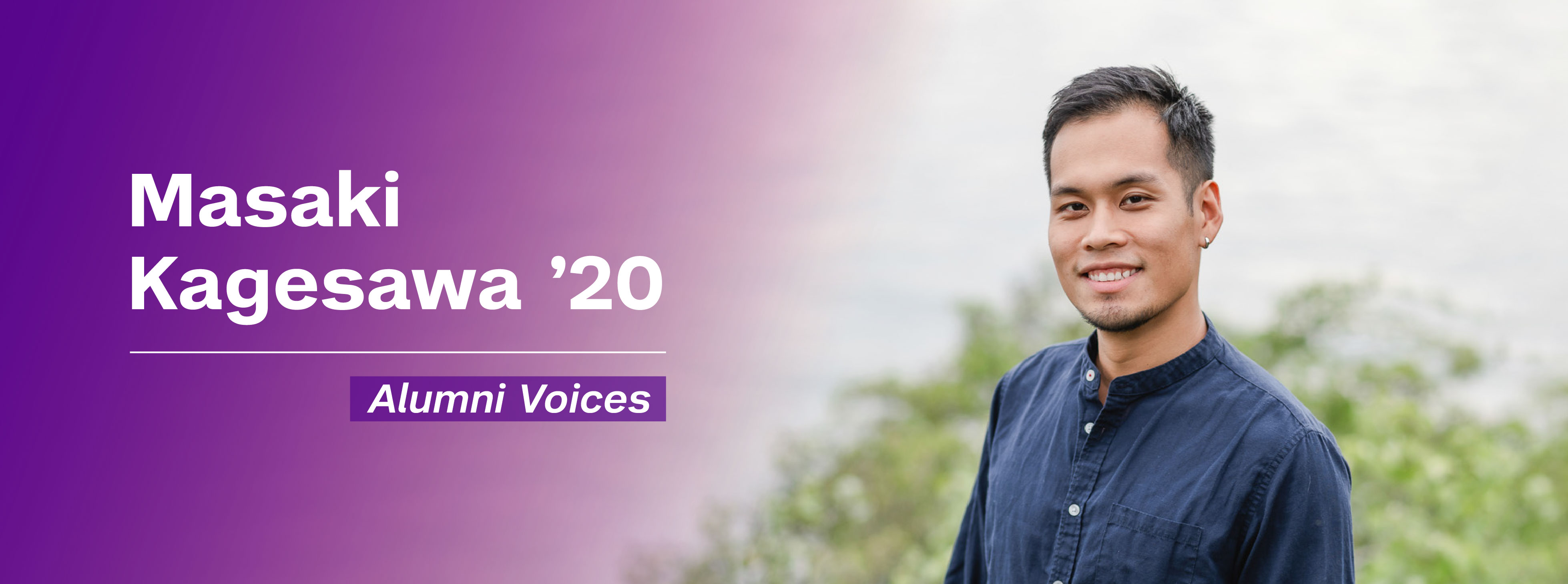
Masaki Kagesawa ’20, Senior Production Engineer at Meta
Hometown: Saitama, Japan
Major: Computer Science
Masaki Kagesawa ’20 shares how being proactive during his college years (including maxing out on 18 class credits every semester!) helped him get on track for a successful career in the tech industry. During the final semester of his senior year, he balanced schoolwork with working remotely full-time at Meta, where he still works as a production engineer. He says he’s always prioritized a healthy work-life balance, and now enjoys a flexible schedule that his job allows.
Why was NYU Shanghai one of your top choices?
When I applied to college, I was aware that NYU already had campuses in Abu Dhabi and Shanghai, and both of them were my top choices ahead of New York. One reason is that I have family in Shanghai, I was already familiar with the environment, and I really missed Shanghai at that point. Also I was interested in technology. It was 2016, when China was growing rapidly with a lot of startups coming along, a lot of new apps coming out. I thought it would be really cool to be in that environment, and at the same time it still gave me the flexibility of going to New York and experiencing other campuses as well. l really took advantage of that—studying away in New York and Madrid. Going to NYU Shanghai would give me diplomas from New York and Shanghai, and I thought that would give me more options if I wanted to develop my future career in Asia or in the West.
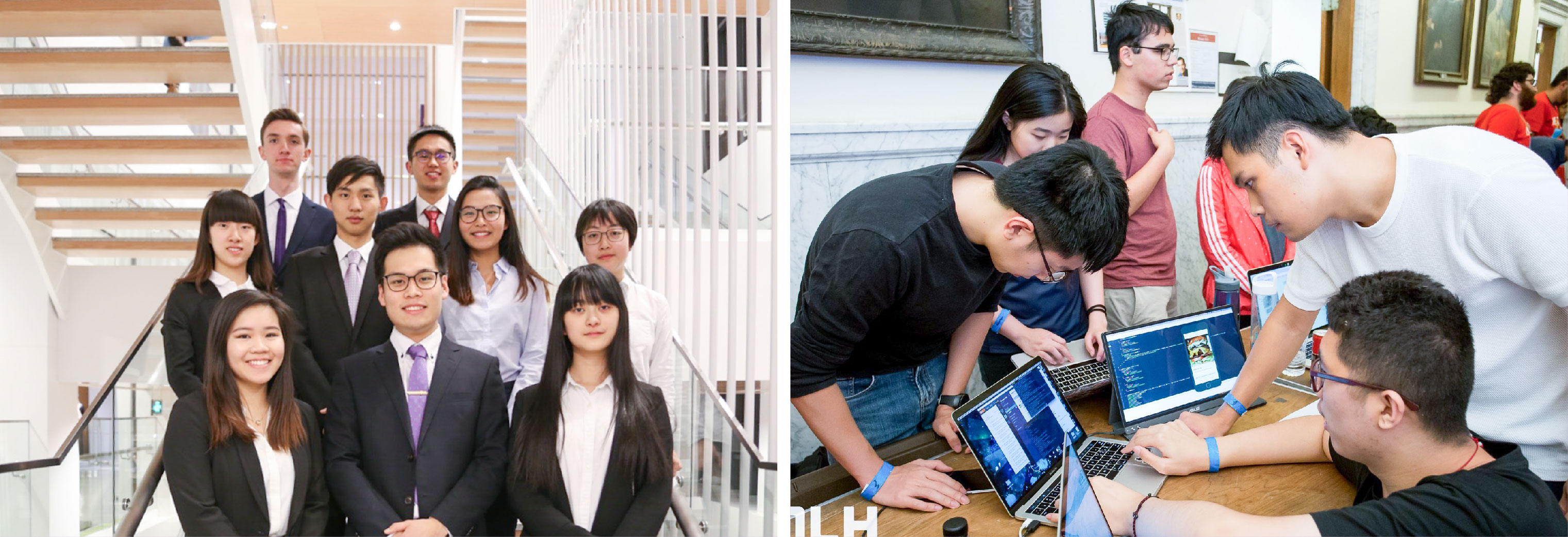
Left: Masaki, front row center, as president of the Undergraduate Business Association (UBA) club. Right: Participating in a hackathon, building real-time location restaurant recommendations based on social media activity.
Why did you major in computer science?
I was really interested in the business side of startups and technology companies, but the summer before starting at NYU Shanghai, I started coding a bit on my own to get a feel for it. I started my first year with the intention of declaring a major in business and finance or data science and actually took classes on both sides.
It wasn't until sophomore year that I decided to switch [and] really focus on computer science. As I learned more about it, I wanted to be able to build rather than work on the business side. After talking to several seniors during my first year, I learned about the working culture of finance and realized that it would be much more demanding, and I'd probably have less of a private life if I had chosen it. It was both the interest in becoming a builder and also a lifestyle decision. Sophomore year I switched, but I still took some business classes here and there out of my own interest.
How did studying away contribute to your career path?
The choices for junior and senior-level classes were much bigger for computer science in New York. I was able to explore and audit a lot of classes like cyber security and also game design. They also had some very practical classes there on building websites which were not offered in Shanghai. That helped me get hands-on experience of what it would be like working in different smaller divisions within computer science after I graduated. Being in New York also exposed me to other students who had internship experience at big American technology companies. I remember NYU’s Wasserman Career Center invited engineers from companies that I wanted to visit, so that provided me the experience of talking with people working in the industry. The biggest advantage was to be able to intern at Facebook, now Meta, in New York, which is still the company that I work at.
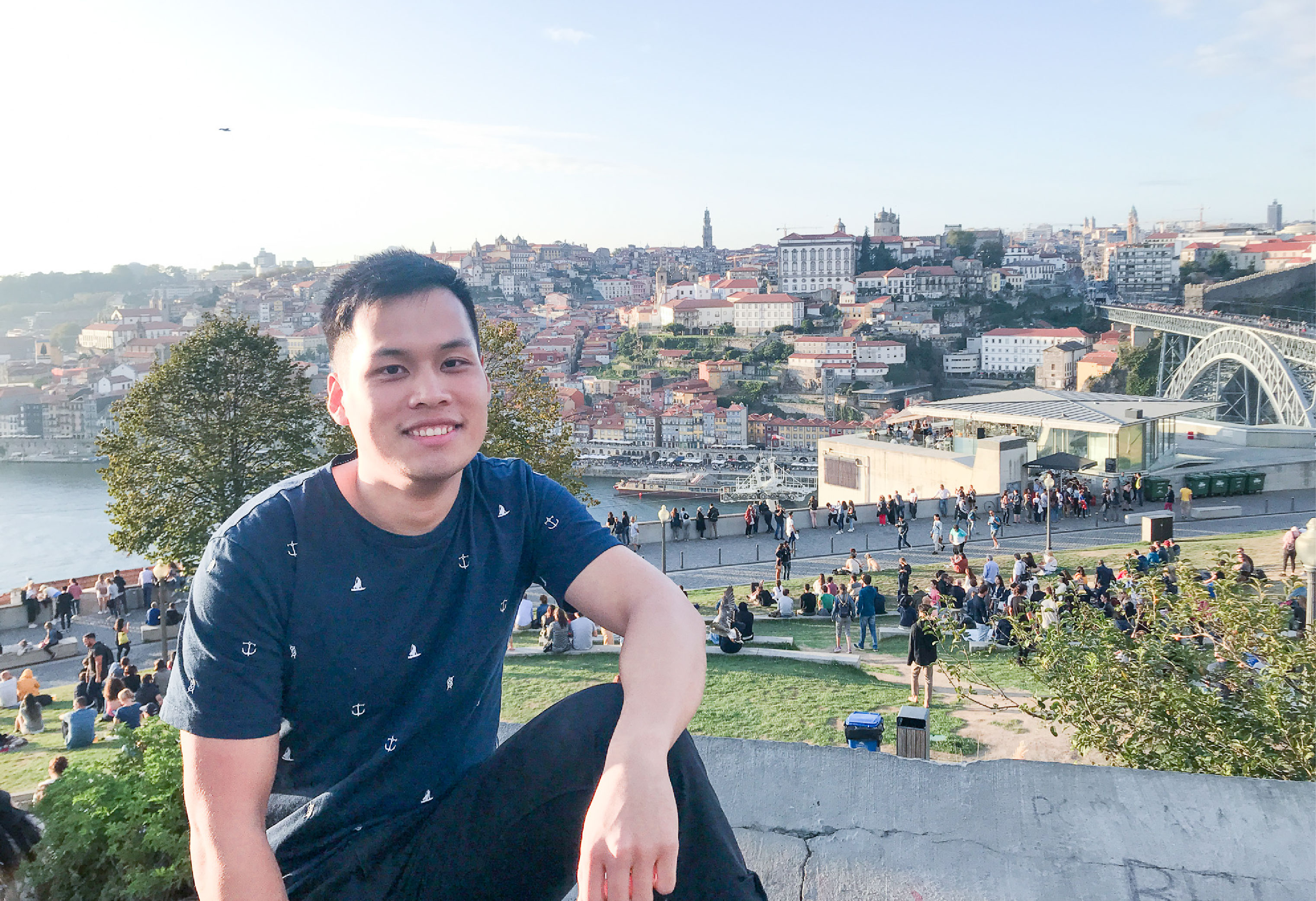
Masaki taking time to explore Porto, Portugal, during his study away at NYU in Madrid, Fall 2019
Freshman, sophomore, and junior year, a lot of my friends were traveling, but I did not have as much fun on purpose to focus on a career. Senior year, after I had secured the internship and they had given me a return offer, that's when I really started relaxing and traveling a lot. I went to Madrid, and that was the best semester I had, where I traveled almost every single weekend to different cities.
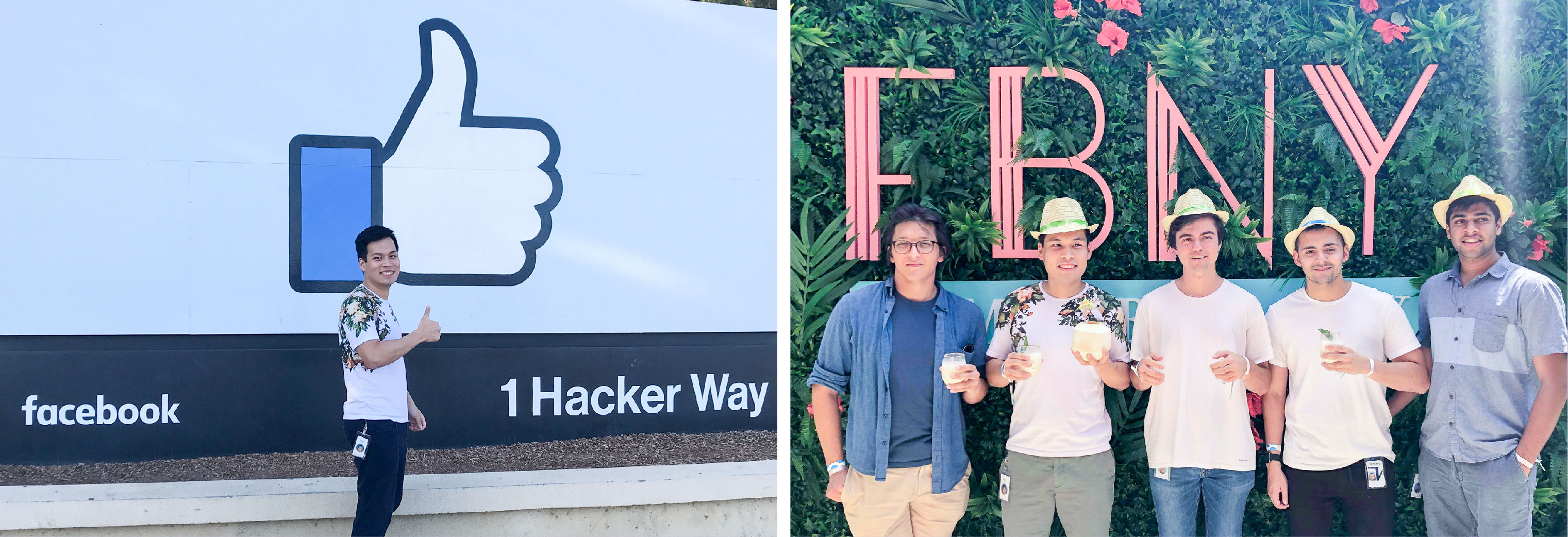
Facebook memories! Left: starting his internship summer of 2019. Right: At a company holiday party, 2019
What was it like being an intern at Meta and then becoming a full-time employee before graduating?
That summer internship really impacted me a lot. I was able to land the job I have today because of that experience. The company provided a lot of resources, housing, food, and mentorship, and it was really nice to get hands-on experience to see what it would be like working there in the future. I interned for 12 weeks and had a mentor within the company that gave me projects; we had daily sync ups to work on those projects. Also because it's a bigger company, there were a lot of other interns from other US schools. So it was a really great experience, both professionally as well as socially, to meet non-NYU students, some of whom I still keep in touch with today.
Because I had taken a lot of credits [earlier on], my senior year was relatively easy. I was planning on [beginning] work a few months after graduating, maybe traveling a bit, but when COVID hit, it canceled that plan. Meta allowed me to work from abroad [in 2020], so I moved back to Japan and stayed with my parents. For a month or two I was a full-time student and an employee. It was refreshing for me to spend more time with my family and at the same time it was really great to keep my mind occupied by working from home.
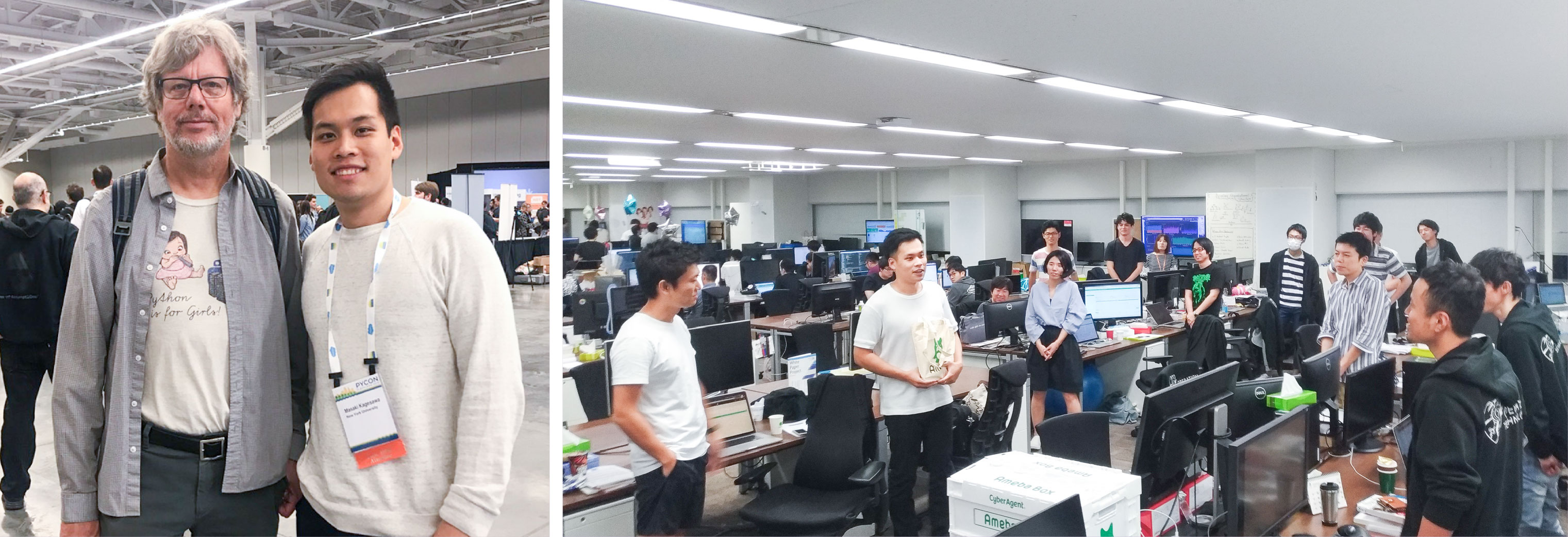
Left: With Guido van Rossum, Dutch programmer and founder of programming language Python, at 2019 Pycon in Cleveland. Right: Masaki during his 2018 summer internship at Cyber Agent, one of Japan’s biggest tech companies
What is your job like as a production engineer?
This is a rather niche role that exists in very few companies. In a mid-size or small company, the title would just be ‘software engineer.’ My daily role is still a lot about coding and debugging issues, but at this scale, my focus is more on making sure that all the systems are running smoothly. When something breaks, I’m the first responder to find the issues and fix them. My focus is more on reliability and efficiency of whatever new things we build rather than the new features that the users see. Fifty percent is coding, maybe twenty to thirty percent is debugging and fixing issues, and the rest would be meetings and planning.
I really like the work culture; they do provide a lot of flexibility for travel. We have “global travel days,” which are 20 work days per year that you get to work from anywhere that you have authorization for and we get 23 days off, so that's more than enough for me to travel, work from other places, and also take vacations.
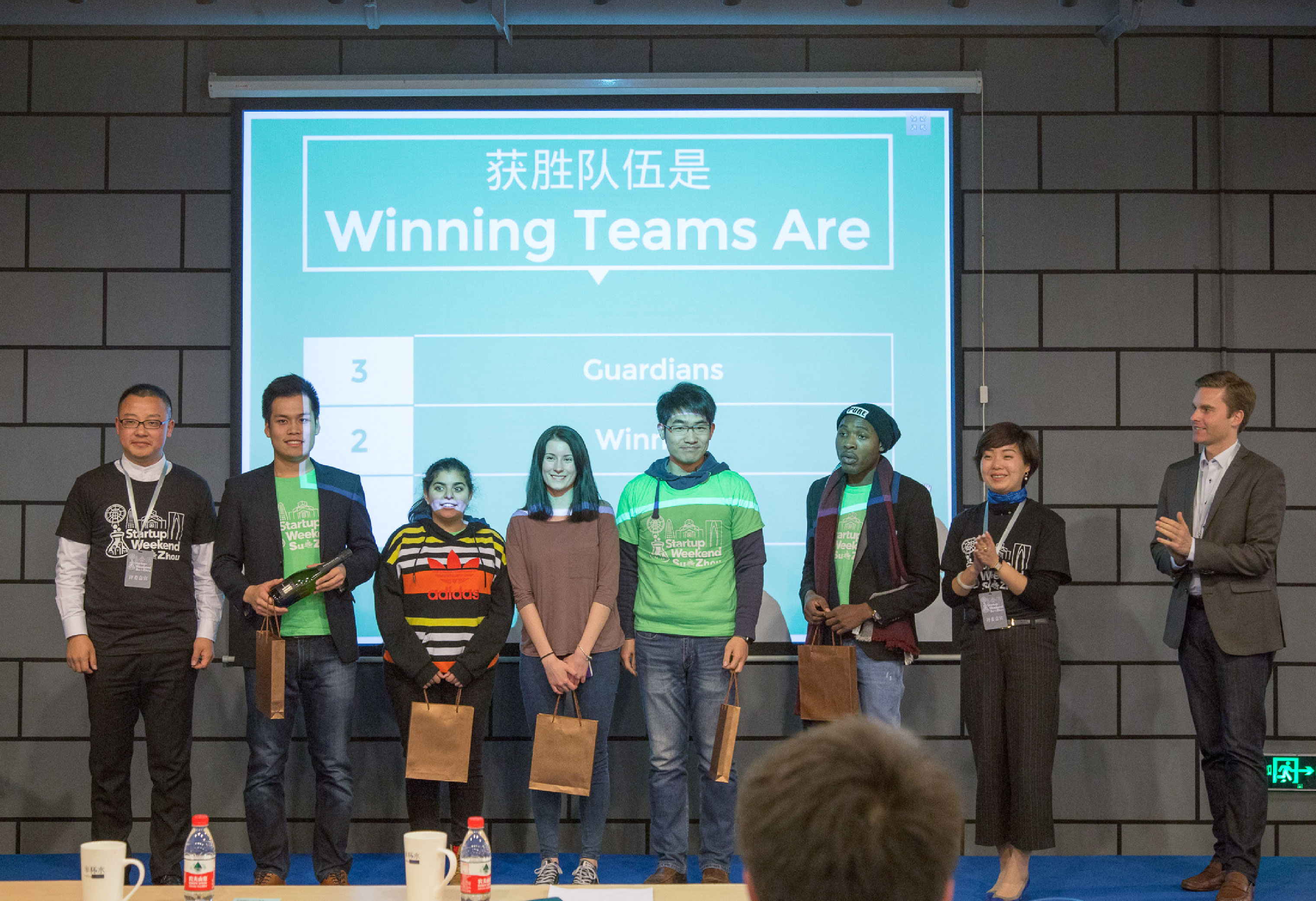
Masaki and his team won second place at StartupWeekend in Suzhou, China in 2017. The 54-hour event gave them hands-on innovation experience, from pitch to prototype.
Do you have any words of advice for NYU Shanghai students?
You don't have to declare a major until later in your sophomore semester, so take advantage of that and take a wide array of classes. Explore everything your first year and sophomore year, but once you decide on a path, really focus on it to make sure that you can land what you want. Take required core classes that are unrelated to your major in your senior year so that you can develop skills related to your major sooner which helps with securing internships.
Be proactive. Reach out to people in person, at events, at the Career Center, on LinkedIn, email alumni. Proactively do that, and you may find opportunities that are not advertised anywhere. I always attended a lot of events from my first year through junior year in Shanghai and in New York. Do that a lot. That is going to help you long term, even if you don't realize right away—to have as wide a range of contacts as you can, both within and outside of the industry you're interested in.
If your goal is to land a good job, at the end of day it’s still a lot more about your technical skills and knowledge. Junior year I went to a lot less events. I was really focused on interview preparations and studying. So I think shifting the gears in your junior year is really important to make sure that you do have your skill set. I recommend traveling somewhere fun at the very end, during senior year, when you have a job secured and you have taken all of your major classes.

